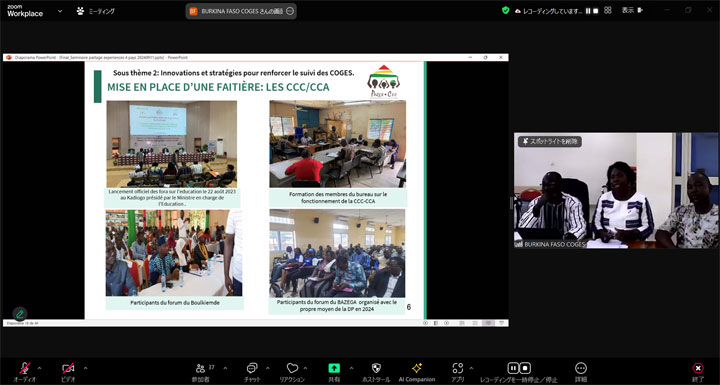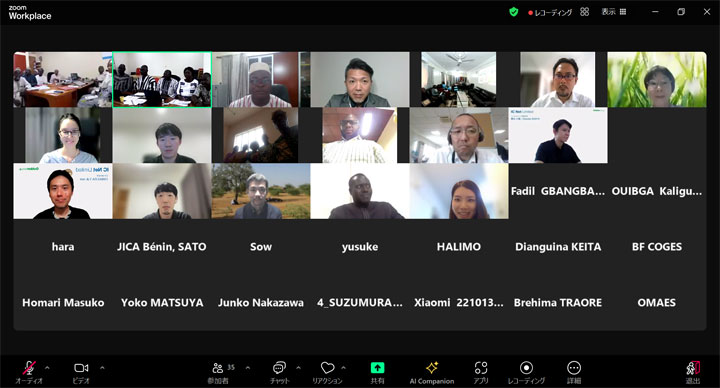Online seminar to share experiences of School for All project with other countries; Burkina Faso, Niger, Mali, and Senegal
Day:2024.11.26
event |
Event title: Online seminar on sharing experiences with other countries
Date: Wednesday, September 11, 2024 18:00-21:00 Japan time
Organizer: PAQER-CEC
Place: Zoom
Participants : over 40 attendees from Burkina Faso, Niger, Mali, Senegal, Madagascar, Djibouti, Benin and Japan
Speakers :
Innovation and Strategies for Strengthening Networks and Monitoring of school management committees (COGES) (Burkina Faso)
Ms. Yabiri KABORE/COMPAORE, Directorate General of Access to Public Education
Innovations and strategies for strengthening the COGES network, The role of COGES in caring for internally displaced students and building peace through community (Niger)
Mr. Abdou Hamidou and Ms. Fatouma Bayéro, Secondary School Decentralization Section, School Management Support Bureau
Project implementation with remote assistance, Comprehensive, low-cost and sustainable approach (Mali)
Mr. Hassane SAMASSEKOU, Decentralization / Decentralization Support Office
Innovation and strategies for strengthening the COGES network, Strategies for reducing the costs of project activities (Senegal)
Mr. Seck IBRAHIMA, Department of Primary Education
The purpose of this online seminar to share experiences with other countries (hereinafter referred to as "this seminar") is to provide an opportunity for participants in the School for All project in the four countries of Burkina Faso, Niger, Mali, and Senegal to share the results of their activities, best practices, and challenges, and to learn from each other.
Since around August 2024, Burkina Faso counterparts have worked together with Japanese experts to set the theme and outline of this seminar, while also exchanging opinions with project members from each country. Furthermore, the counterparts from each country played a central role in preparing the presentations on each country's initiatives on the day of the seminar, and under their leadership, we have been gradually examining the content and improving the quality.
The program was divided into two parts. In the first part, each country selected two themes and had representatives give presentations on their achievements, good practices, and challenges. Burkina Faso introduced an online monitoring system aimed at strengthening COGES monitoring and a strategy for strengthening networks between COGES, Niger introduced home visits to support internally displaced persons and prevent dropouts, Mali presented a sustainable learning improvement system through community cooperation, and Senegal introduced an approach that utilizes community-level forums and low-cost online tools.
In the second part, there was a Q&A session related to the presentations, and a discussion on success stories and challenges from each country. Each country actively raised opinions and questions, and many participants took interest in the sustainable management methods of Education Forum and the importance of local community involvement. In particular, most of participants commented that cooperation between local governments and local communities is essential for the sustainability of the project.
On the other hand, they recognized that financial constraints, lack of resources on the part of local governments and communities, and large differences in capacity between local governments could be barriers to project implementation. New cooperation models involving local communities, such as home visits for dropout students and the hiring of facilitators for internally displaced persons, as well as the introduction of project management and monitoring methods using online tools, are innovations for providing more sustainable educational support and have the potential to be applied to future global educational support activities.
In closing, the participants called for continued exchanges and information sharing in the future, which will hopefully lead to further improvements in education projects and sustainable development.
Table 1:Presentation Themes of each countries
| Burkina Faso | -Innovations and strategies to strengthen the network of COGES1
-Innovations and strategies to strengthen COGES monitoring |
| Niger | -Innovations and strategies to strengthen the network of COGES -Role of COGES in the care of internally displaced students and peacebuilding through communities |
| Mali | -Project implementation through remote assistance -Comprehensive, low-cost and sustainable approach |
| Senegal | -Innovations and strategies to strengthen the CGE network -Innovations and strategies to reduce the cost of project activities. |
In a survey conducted after this seminar, more than 90% of the 15 representatives from each country answered that they were "very satisfied" or "satisfied" with the seminar content, and that they were able to notice commonalities in the issues, solutions, and best practices of each country. In addition, 87% of respondents also confirmed that they felt that they could apply some of the examples from other countries to their own country's activities.
We strongly believe that the reason this seminar was a meaningful opportunity was because all the people in each country involved generously offered their cooperation and advice from the preparation stage. And the fact that more than 40 participants, including those from project implementation countries other than the participating countries, showed interest in this seminar was a great encouragement to the counterparts and project members in each country.


1 Each country has the different abbreviation of School Management Committees: COGES for Burkina Faso and Niger, CGS for Mali, CGE for Senegal
scroll